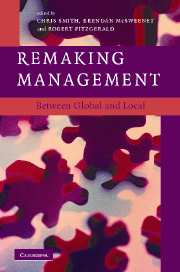Book contents
- Frontmatter
- Contents
- List of tables
- Notes on contributors
- 1 Remaking management: neither global nor national
- Part I Conceptualising International and Comparative Management
- Preface: Dominance, diversity and the historical process in management practice
- 2 Work organisation within a dynamic globalising context: a critique of national institutional analysis of the international firm and an alternative perspective
- 3 Cultural diversity within nations
- 4 Business systems, institutions and economic development: the value of comparison and history
- Part II Systems in Transition
- Part III Society as Open and Closed
- Part IV The Search for Global Standards
- Index
2 - Work organisation within a dynamic globalising context: a critique of national institutional analysis of the international firm and an alternative perspective
Published online by Cambridge University Press: 06 July 2010
- Frontmatter
- Contents
- List of tables
- Notes on contributors
- 1 Remaking management: neither global nor national
- Part I Conceptualising International and Comparative Management
- Preface: Dominance, diversity and the historical process in management practice
- 2 Work organisation within a dynamic globalising context: a critique of national institutional analysis of the international firm and an alternative perspective
- 3 Cultural diversity within nations
- 4 Business systems, institutions and economic development: the value of comparison and history
- Part II Systems in Transition
- Part III Society as Open and Closed
- Part IV The Search for Global Standards
- Index
Summary
Introduction
In the modern world globalising forces are helping to challenge structures of national difference. The outcome of this process is not some set of ‘worldly’ or ‘global’ best practices, however, but instead more hybridity and blending of practices drawn from different histories and environments. Rather than universalism or nationalism within economic action at the level of the firm, we have a much more nuanced, layered and dynamic set of competing actions, which draw from a discourse of global practices but are not global; and a discourse of institutional specificity, but one that is not functionally bounded. This chapter examines these tensions and, at the same time, proposes a framework to theorise the sources of diversity and convergence that operate within organisations exposed to internationalising processes
Three distinct positions will be distinguished. First, there are those attached to the idea of distinctive ‘national business systems’, who retain a belief in the distinctive organisation of work, management and employment relations characterised by a national system of institutions and cultural legacies. Such writers argue the case for the persistence of national differences and the continuation of diversity based on the ‘embedding’ of the organisation within these institutional rules. Moreover, any external international forces, such as multinational firms, that come into these national environments become local players, not destroyers of local action.
- Type
- Chapter
- Information
- Remaking ManagementBetween Global and Local, pp. 25 - 60Publisher: Cambridge University PressPrint publication year: 2008
- 7
- Cited by



